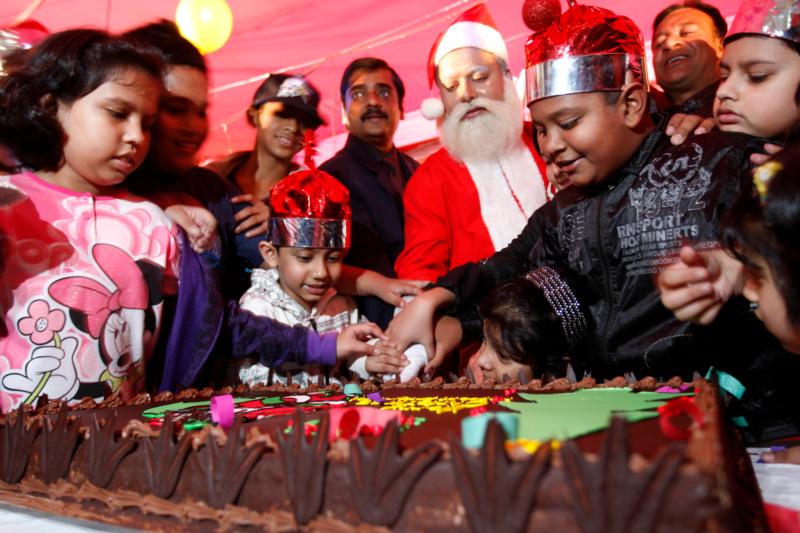Sometimes I get stuck on how I think Christmas morning should be — namely, me well-rested and with a cup of coffee warming my hands as my children cheerfully take turns unwrapping beautifully wrapped presents from under the tree.
In reality, I’m lucky if I can hurdle the wrapping paper and cardboard in my path to consume enough caffeine to make up for the hours spent searching for hidden presents and wrapping gifts without enough tape.
But there’s one Christmas moment that always feels good, no matter how bleary-eyed my husband and I are. It’s when my kids turn out the lights in the kitchen and sing “Happy Birthday” to Jesus in front of a highly flammable chocolate cake.
[hotblock]
This is how I know my kids get the reason for the season. They bake the cake on their own and decorate it after Christmas Eve Mass. Even though there’s an avalanche of presents coming their way in the morning, they know the real gift is the birth of our Savior.
That’s a pretty good reason to eat cake.
Our Jesus cake is one of my favorite Christmas traditions, up there with using my grandmother’s china at dinner. For me, it’s a moment that’s authentically us. It connects us with Jesus by making him totally relatable to a crazy family of five. A baby. A birthday. A party with the people who matter most.
That’s why Christmas traditions hold such power. They remind us of God’s loving hand in our lives. They strengthen our spiritual ties to faith and each other. They make us feel secure. We need that kind of power more than ever to face the challenges of a secular world.
Here are some ways to create your own Christmas traditions:
— Make Christmas Eve special.
No matter how much you gussy up your home for Christmas, consider leaving something undone. Wait to put the star on top of the tree. Hang your wreath on the front door on Christmas Eve. If you set out a creche, add baby Jesus just before bed.
Too often, we get caught up in the idea of a perfect holiday. There’s a risk of forgetting what we’re really getting ready for. The truth is, our Christmas is always perfect because of Jesus — not the bow or the tree or the presents.
— Count your blessings — literally.
Take a twist on the traditional Advent calendar by instead counting up to Christmas. Finding something to be grateful for each day. At our house, we’ve literally written our blessings on scraps of paper and taped them to our dining room wall.
Two years later, they’re still there because I can’t bring myself to remove such visible reminders of how much goodness is in our world.
— Give your children a voice.
It’s a little dangerous to keep a hungry family from a homemade Christmas feast. But hearing your children offer their own prayer before a meal is usually worth a few rumbling stomachs. At Christmas, they get the chance after we say our traditional grace.
In the beginning, it was a struggle to hear them ramble while steaming food tempted us from our plates. As they get older, I realize the beauty of hearing what matters to them. Maybe they are thanking God for their Mom-Mom’s mashed potatoes or their favorite Ninja Turtle. What I hear is: “Thank you, God, for surrounding me with love.”
[hotblock2]
— Keep cards in Christmas.
Even in the age of instant connection, there’s something special about a Christmas card. It means someone took the time to let you know they are thinking of you. Honor that thought by reading one card aloud each night during the Christmas season. Let your kids take turns picking the cards and share a special memory about the person who sent them.
We hang our Christmas cards by our front door so they are the first thing we see when we come in and the last thing we see when we go out. On those days when life seems extra frazzled, those family pictures and holiday wishes are like a paper hug.
It’s those kind of traditions that make the holidays special. They remind us we are part of something larger than ourselves. And isn’t that what the family of God is all about?
***
Bothum is a freelance writer and a mother of three.
PREVIOUS: At Christmas Eve Mass, a light shines in the darkness
NEXT: How the Christmas story points beyond itself




Share this story